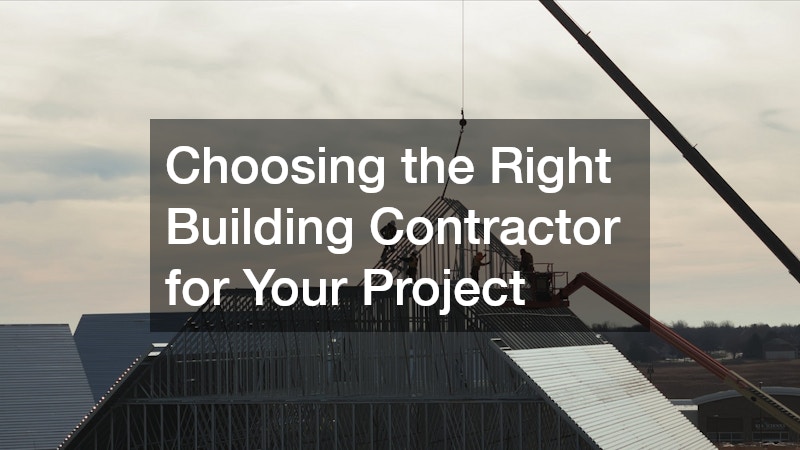A construction project—whether it’s a new home, a commercial space, or a renovation—requires careful planning, precise execution, and the right expertise to bring your vision to life. The success of the build often comes down to one critical decision: selecting the right building contractor. This choice can make the difference between a smooth, well-organised project and one filled with delays, miscommunications, and unsatisfactory results.
This guide explores what a building contractor does, why they are essential, and the key qualities to look for when hiring one for your next project.
Understanding the Role of a Building Contractor
A building contractor is responsible for overseeing and managing every aspect of a construction project from start to finish. They coordinate with architects, engineers, and subcontractors to ensure the project is completed according to specifications, timelines, and quality standards.
Their responsibilities often include:
-
Interpreting blueprints and design plans to guide the construction process.
-
Sourcing and managing materials needed for the build.
-
Scheduling and supervising subcontractors, such as electricians, plumbers, and carpenters.
-
Ensuring compliance with local building codes, safety regulations, and permit requirements.
-
Monitoring progress to keep the project on track and on schedule.
In essence, a building contractor acts as both a project manager and a quality control expert, ensuring that every phase of the work meets expectations.
Why the Right Contractor Matters
The skills, experience, and professionalism of a contractor have a direct impact on the final outcome of your project. A competent contractor will not only deliver a high standard of craftsmanship but also handle challenges efficiently, preventing small issues from becoming major setbacks.
An experienced building contractor understands how to balance multiple aspects of a project simultaneously—budget, timeline, labour, materials, and safety—while keeping the client’s vision at the forefront. They also maintain strong communication channels, ensuring you’re kept informed and involved in every significant decision.
Qualities to Look for in a Building Contractor
Choosing a contractor is more than simply finding someone with a license. It involves assessing a combination of technical skills, work ethics, and professional attributes that ensure a smooth building process.
1. Proven Experience
Look for a contractor with a strong track record in projects similar to yours. Their experience will often translate into better problem-solving skills, knowledge of local regulations, and established relationships with reliable suppliers and subcontractors.
2. Strong Communication Skills
Clear communication is critical in construction. The contractor should be able to explain complex processes in straightforward terms, keep you updated on progress, and address concerns promptly.
3. Organisational Skills
Managing multiple tasks, schedules, and teams is part of a contractor’s daily responsibilities. Strong organisational skills help prevent delays, manage workflow efficiently, and ensure deadlines are met.
4. Reputation and References
A reputable contractor will have positive testimonials, references, and possibly a portfolio showcasing completed projects. Speaking with past clients can give you valuable insight into their work ethic and reliability.
5. Commitment to Quality
The right contractor will pay attention to detail and use the best materials suited for your project, ensuring the final result meets high-quality standards.
The Importance of Licensing and Insurance
Before hiring, verify that the contractor is properly licensed in your area. Licensing confirms they have met specific training and competency standards required by local authorities. Additionally, insurance—such as liability coverage and workers’ compensation—protects you from potential legal and financial issues if accidents occur on site.
Building a Strong Client-Contractor Relationship
A successful project depends not just on technical expertise but also on the relationship between you and your contractor. Setting clear expectations from the beginning helps build trust and minimises misunderstandings. This includes:
-
Outlining the project scope in detail.
-
Establishing realistic timelines.
-
Agreeing on communication methods and update frequency.
Maintaining an open dialogue throughout the project allows for adjustments if necessary, while ensuring your vision remains the priority.
How a Contractor Ensures Smooth Project Management
A skilled contractor acts as the central point of coordination, making sure that different trades work together efficiently. They manage scheduling so that each stage of construction flows logically into the next, reducing downtime and preventing overlaps that could delay the project.
They also troubleshoot issues as they arise—whether it’s a delivery delay, unexpected structural complication, or weather-related setback—by quickly implementing solutions that keep the build moving forward.
Choosing the right building contractor is one of the most important decisions you’ll make for your construction project. The right professional brings not only the technical skills to execute the build but also the organisational abilities to keep everything on track and the interpersonal skills to maintain a positive working relationship.
By focusing on experience, communication, reputation, and professionalism, you can find a contractor who will turn your vision into a finished structure you can be proud of. A well-chosen building contractor doesn’t just build walls and roofs—they help build trust, reliability, and the foundation for a successful project.




